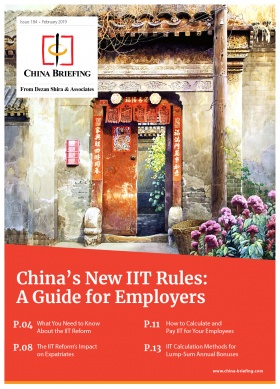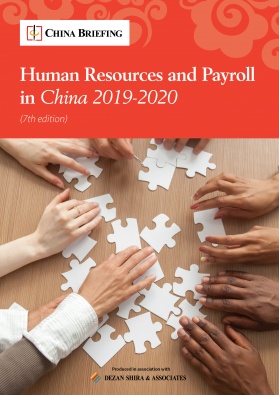How to Determine Your Foreign Employees’ IIT Liability in China: COVID-19 Travel Ban Series
Due to the pandemic spread of COVID-19, countries worldwide, including China, have implemented travel restriction policies that have prevented the return of foreign nationals to the workforce. China announced the Temporary Suspension of Entry to Foreign Nationals policy on March 27, which took effect the following day, from March 28, 2020.
This means that foreigners who hold the following visas are currently not allowed to enter China:
- Chinese visa;
- Residence permit;
- APEC business travel card; and/or
- Port visa.
As a result, there will be significant changes to the residence days for the tax year 2020 for many expats who work in China. Some expats who were previously working in China may now be stranded overseas and unable to come back to work in China at present. On the other hand, some expats who previously came to China for multiple short-term business trips may be looking to stay in China for a longer period, due to travel restrictions worldwide.
As you may know, expats’ China residence days is a key factor to calculating their PRC Individual Income Tax (IIT) liabilities and complete their IIT calculations and filings in compliance. From a tax perspective, it is important for the employer and expat employees to pay attention to the impact of the travel restriction policy on the IIT assessment.
The change of tax residency status for non-China domiciled individuals
An individual is regarded as being domiciled in China if he/ she habitually resides in China due to household registration, family, or economic interests. Expats working in China usually fall into the category of non-China domiciled individuals.
According to the Amended PRC IIT law and regulations effective from January 1, 2019, if a non-China domiciled individual stays in China for 183 days or more in tax year, he/ she will be regarded as a China tax resident for the tax year.
On the other hand, if a non-China domiciled individual stays in China for less than 183 days in a tax year, he/ she will be regarded as non-China tax resident for the tax year. Please note that only a day with 24 hours inside China would be taken into account for calculating their China residence days.
Due to the travel restriction policy, expats who previously planned to stay in China for 183 days or more for the year 2020 – but are now stuck overseas – may change from China tax residents to non-China tax residents for the year 2020. Similarly, those expats who planned to stay in China for less than 183 days – but are now forced to stay in China for a longer period – may change from non-China tax resident status to being considered as China tax residents for the year 2020.
Tax calculation and filing requirements for the change of tax residency status
Given the PRC IIT reform effective since January 2019, one of the complications in terms of calculating and filing IIT for expats is to do with the assessment of their tax residency status, which now needs to be reviewed on a yearly basis. What’s more is that expats must pre-assess their China residence days at the very beginning of the tax year. This is because the IIT calculation and filing methods are different between tax residents and non-tax residents under the Amended PRC IIT law and regulations.
Due to the COVID-19 pandemic, what was pre-assessed at the beginning of year 2020 may be quite different as 2020 unfolds.
According to the Announcement 35 [2019] published by the Ministry of Finance (MoF) and the State Taxation Administration of the People’s Republic of China (STA), if a non-China domiciled taxpayer who previously assessed as a non-China tax resident extends his/ her China residence period and finally becomes a China tax resident for the tax year, he/ she would be required to complete an Annual Tax Reconciliation (ATR) filing when the tax year ends (that is, March 1 to June 30 of the following year).
However, if he/ she leaves China during the tax year and is unlikely to come back to work in China in that tax year, the ATR filing could be completed before he/ she leaves. In addition, his/ her IIT should be recalculated under the tax resident calculation method for the ATR.
In the opposite case, if a non-China domiciled taxpayer who previously assessed as China tax resident shortens his/ her China residence period and finally becomes a non-China tax resident, he/ she should revise his/ her monthly IIT calculations under the non-tax resident calculation method. The revised monthly IIT filing for the tax year is correspondingly required to be completed before January 15 of the following year.
Potential changes to your expat employee’s PRC IIT liability
According to the Amended PRC IIT law and regulations, expats, subject to certain conditions, are usually taxed in China for their China-sourced salary only.
Generally speaking, expats’ work arrangement, salary cost releasing and bearing method, expats’ China residence days, and the benefit of Double Tax Treaty between their home country and China – could all impact the expats’ PRC IIT liability. Now, due to the travel restriction policy, expats’ China presence days for this tax year may change significantly and therefore bring possible changes to their PRC IIT liability.
If you are interested in analyzing your/ your expats’ PRC IIT liability or seeking possible arrangement that might impact your/ their PRC IIT liability, please feel free to contact us at china@dezshira.com. DSA is more than happy to provide tax briefing or tax advisory services to you.
Explore Our Related China Business Insights
About Us
China Briefing is written and produced by Dezan Shira & Associates. The practice assists foreign investors into China and has done so since 1992 through offices in Beijing, Tianjin, Dalian, Qingdao, Shanghai, Hangzhou, Ningbo, Suzhou, Guangzhou, Dongguan, Zhongshan, Shenzhen, and Hong Kong.
Please contact the firm for assistance in China at china@dezshira.com.
We also maintain offices assisting foreign investors in Vietnam, Indonesia, Singapore, The Philippines, Malaysia, Thailand, United States, and Italy, in addition to our practices in India and Russia and our trade research facilities along the Belt & Road Initiative.
- Previous Article 46 New Cross-Border E-Commerce Zones Unveiled by China
- Next Article Why the Shanghai FTZ Will be Key to the City’s Post-COVID Recovery










